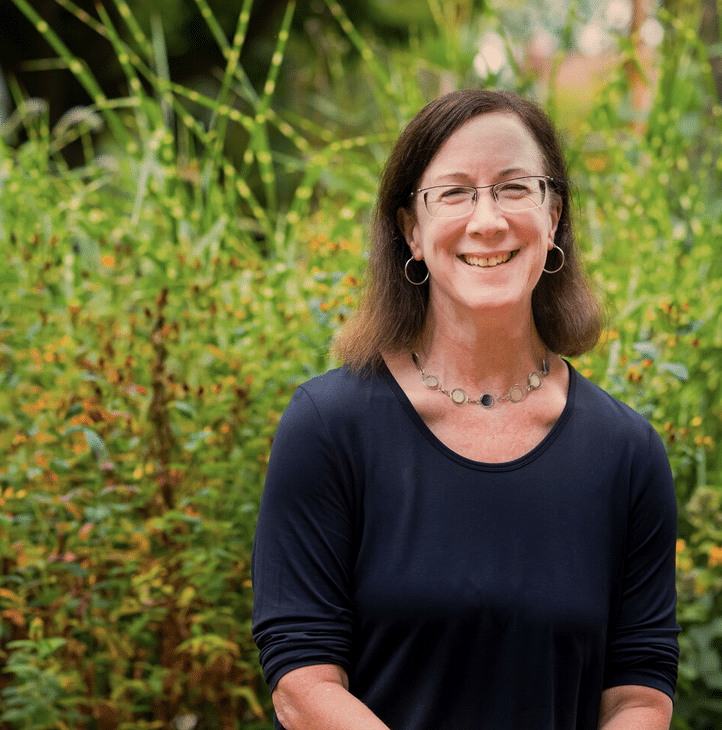
The Director’s Blog by Ann Gadzikowski includes tips on how to support your child’s cognitive, social and emotional growth as well as information on play-based learning and emergent curriculum. See more about Ann below.
Ask Ann About… How are Babies Made?
Posted 1/20/2026
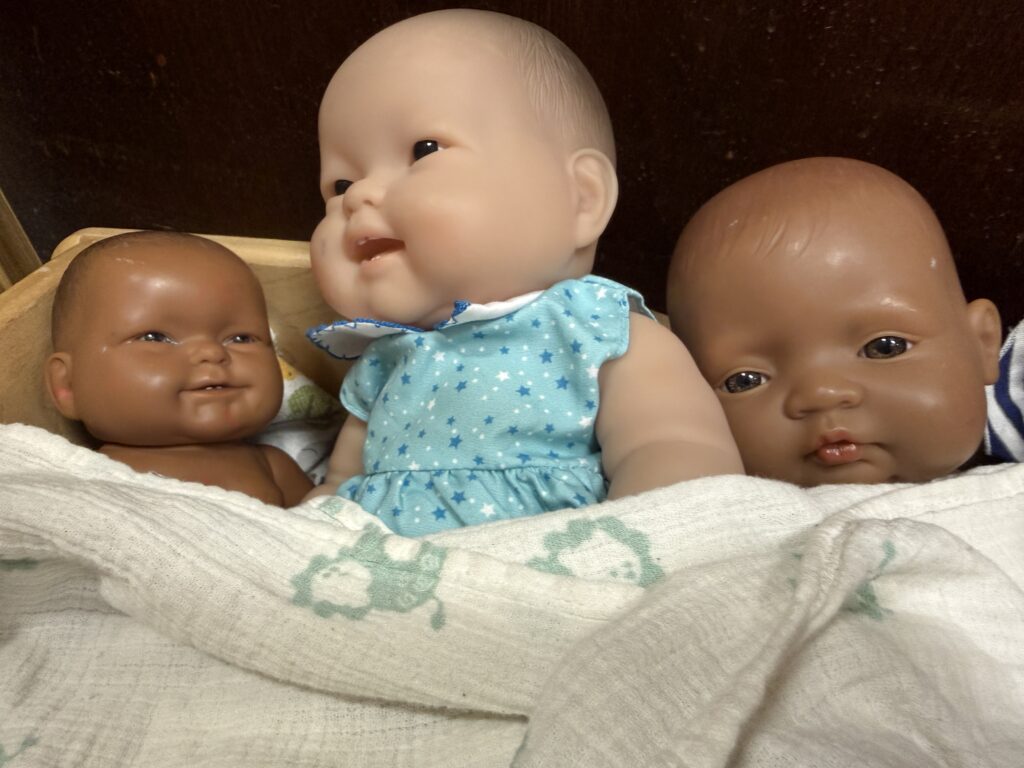 How do I explain exactly how babies are made?
How do I explain exactly how babies are made?
I had to laugh when I read this one from the Ask Ann box. What a big question! First of all, I would caution against explaining “exactly” how babies are made in one big talk. A preschool child is probably not ready to learn all the details. Rather, information about how babies are made can be shared over time, on a need-to-know basis, and tailored to your child’s attention span and developmental level.
When preschool children ask about how babies are made, they are usually not asking about sex. They are probably more interested in learning a bit of biology about how a baby begins and grows in a uterus, and how it is born. As described in the wonderful picture book What Makes a Baby by Cory Silverberg, “When grown ups want to make a baby they need to get an egg from one body and a sperm from another body. They also need a place where the baby can grow.”
It is usually not necessary to explain sexual intercourse at this age, especially if that is not how your own child was conceived. Respond to your child’s questions as directly and accurately as you can. For example, a preschool child can understand that when a baby is born the baby might come out of the uterus through the vagina or a doctor might make a special opening for the baby to come out (and then close up the opening).
During any important or challenging conversations, try to stay open and curious about your child’s thinking and ideas. After offering some information, you can ask, “What do you think about that?” or “What else do you want to know?” Pausing to ask your child questions also gives you a moment to breathe and think about what else you might want to say.
These are not one-and-done conversations. I encourage parents to tell and show their child that talking about bodies and babies is important and you are open to having these kinds of conversations often. Tell your child, “I’m glad we’re talking about this. It’s important. Let’s do this again whenever you’re wondering about things.”
You may not know “exactly” what to say to your child about how babies are made, and that’s okay. Just begin with a few basic facts and see where that conversation takes you. It’s also fine to say, “Hmm. I want to think about that a bit before we talk about it. I’ll do some thinking and then we’ll have a good conversation.” Remember that there will be other questions and conversations in the future, so buckle in and enjoy the journey!
Toy Time
Posted 12/9/2025
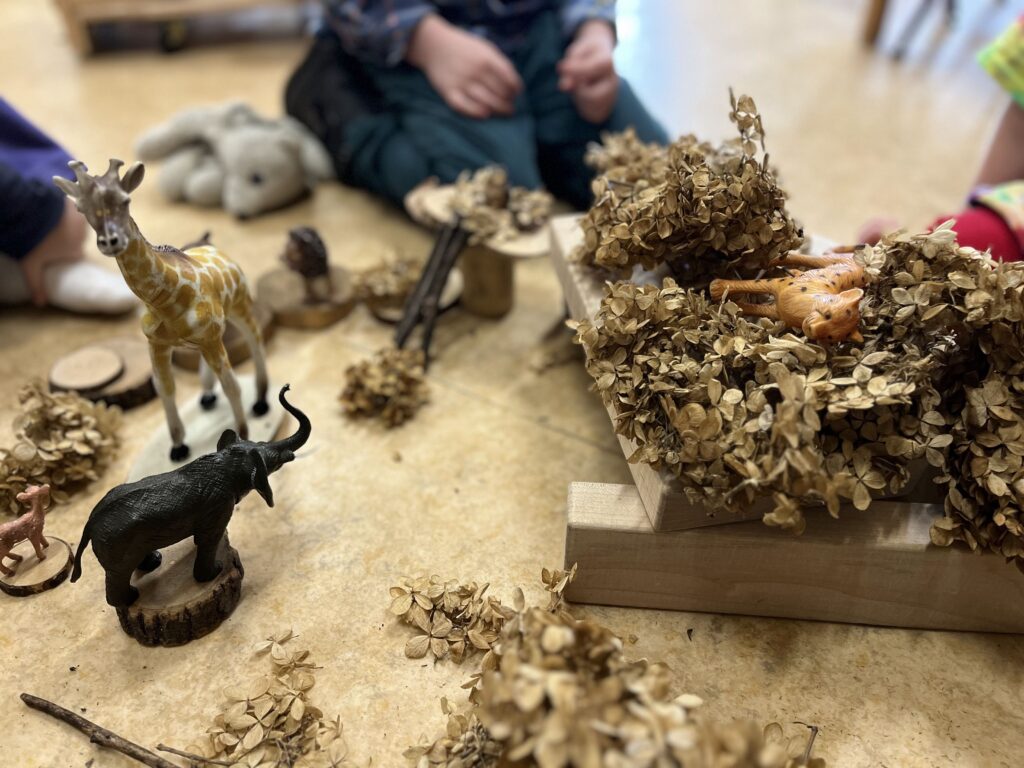
It’s that time of year again. No matter what holidays you celebrate, your family is probably exposed to a ton of buzz about hot new toys and gadgets. Even the most mindful parent can feel overwhelmed by the pressure to buy the perfect toy that will make your child happy, smart, popular, calm, creative, resilient, healthy, and responsible.
There is no such thing as a perfect toy and that most children actually benefit from having fewer toys. One research study compared how children played when offered 16 toys to how children played when offered just 4 toys. Can you guess what happened? The children with fewer toys showed significantly greater engagement, complexity, and creativity in their play.
One toy trend I suggest avoiding altogether is the new wave of AI-powered gadgets for young children, such as talking teddy bears and other interactive devices. Not only are there some significant privacy and safety issues with this new technology, I wonder about the long-term impact on children’s cognitive development. The whole point of pretend play is to create your own characters and stories and I’m concerned about the harm to children when that type of play is replaced by AI-generated words and images.
And yet, you may still find yourself in the position of shopping for a new toy for your child. I always suggest an open-ended construction toy that children can use in creative ways to build something from their imagination. Wooden blocks are a classic. Also magnetic tiles and plastic bricks, but steer clear of the fancy branded sets that are designed to promote a specific movie, game, or TV show. Choose a toy that can be used again and again in many different ways to tell many different stories.
Another great option is a set of realistic animal figures, the kind we use here at school. We have collections of small farm animals, jungle animals, woodland creatures, sea creatures, insects, etc. that we rotate in the classrooms. Children enjoy these kinds of toys at home too. When my daughter was a preschooler, one of the best gifts she ever received was a set of toy dogs. She played with those dogs almost every day for several years, each time making up new stories and pretend scenarios.
In short, you can best support your child’s play by providing your child with a core collection of durable and open-ended toys that allow for lots of different pretend scenarios and creative projects.
Ask Ann About… Children Wanting Lighter Features
Posted 10/14/2025
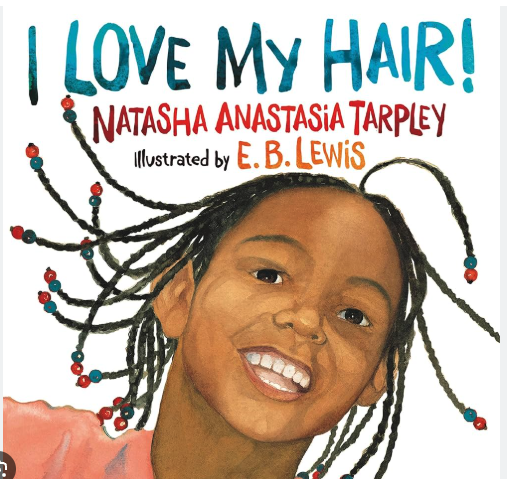 My child came home from school wanting “lighter” features (hair). How should I address this?
My child came home from school wanting “lighter” features (hair). How should I address this?
As a community that values diversity, we pay close attention when a child makes a comment about favoring lighter features over darker ones. There’s plenty of research that shows that even very young children pick up on the bias against darker features that’s prevalent in the media and in society at large. That said, I would want to explore your child’s comments further to see if there might be other possible explanations. Try asking a few open-ended questions (“Tell me more about that…”) and observe your child’s behavior and interests over time to see if there are any other reasons your child might be expressing a preference for a certain hair color or hair style.
If it becomes clear your child is feeling bad about their own dark hair, then it’s important to listen with empathy and demonstrate your own appreciation for your child’s dark features. Picture books like Bodies Are Cool and The Skin You Live In help deliver that message. Looking at these books together creates an opportunity for open conversation with your child. At school, we find that these kinds of stories and conversations help to affirm each child’s identity, including their physical appearance, and nurture a sense of confidence in their own unique individual characteristics. It also helps to choose toys and dolls that mirror your child’s features.
I think it’s interesting that your child commented specifically on their hair, because how we style and even color our hair can be a matter of choice and creative expression. There are things you can do to offer your child a sense of autonomy and control over their own hair. Young children can be empowered (within reason) to make their own decisions about choosing a haircut (short or long, bangs or no bangs) and how their hair is styled each day (pony tails, clips, headband, etc.). Remember that another important anti-bias strategy is using nongendered language when talking about hair styles. For example, we can say, “Some people like long hair, some people like short hair.” Another recommended picture book is I Love My Hair! by Natasha Tarpley.
For a more in-depth discussion of how to help children resist developing or internalizing bias, I recommend the book How to Raise an Anti-Racist by Ibram X. Kendi.
Ask Ann About… Wasting Food
Posted 9/25/2025

I hate seeing my child waste food, but I don’t want to give them a weird hangup about food. What’s the middle ground?
Like many adults, I have unpleasant childhood memories of my parents pressuring me to eat food that I didn’t want. I can understand why you might be worried about giving your child hangups or anxieties about food. But the fact that you’re reflecting on this question and thinking carefully about your child’s relationship with food means that you’re already on the right track.
At Families Together, we encourage children to “check in with their bodies” to find out whether they are hungry. This might come up at snack time when a child asks for more crackers. If a child then throws away the crackers that they asked for, we’ll gently remind them that next time they need to “check in with their bodies” before asking for more food.
I wonder if your question is also about how we introduce new foods to children that they might not like? A child may be genuinely hungry but doesn’t want to eat the food that’s on their plate. Pediatricians and nutrition experts say that children often need multiple exposures to new tastes before they will try and enjoy a new food. This means offering very small portions of the new food on many different occasions. It also helps to model trying out a new food, as well as telling your child stories about your own experiences learning to like a new food.
From a practical perspective, some leftover food can be saved or composted. But certain kinds of uneaten food must be thrown away. When that happens, we can use it as a teachable moment. We can explain to our child that we don’t like throwing away food because food is important. “Food takes time to grow and cook. Food costs money. Being careful with food is one way we take care of ourselves, each other, and the Earth. In the future, let’s try some new ways to serve and eat food so that we don’t waste as much. We’ll keep learning together.”
At our Lunch Bunch program, we do see a lot of leftover food in children’s lunches. At the end of eating time, we encourage children to pack up and save what’s left of their lunch. Providing your child with food in containers with lids can be very helpful when packing up leftovers.
Overall, young children are still learning about food and about their bodies. This is a process that will last a lifetime. Talking, planning, and learning together as a family is the best solution to reducing food waste and encouraging healthy eating.
Back to School Help
Posted 8/13/2025
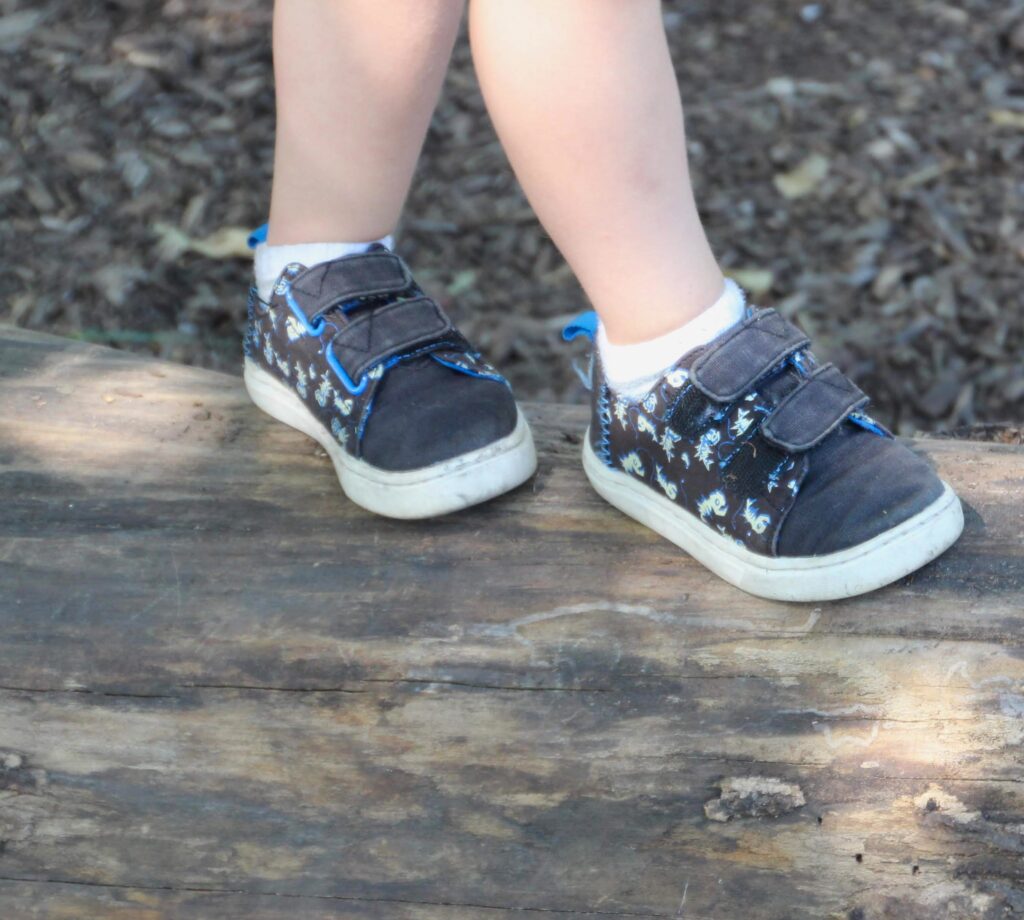
For most children, starting the school year is a time of new independence. As parents, we do our best to give our children a sense of confidence so they will be ready for the challenges ahead. But remember that one of the most important life skills is the ability to ask for help. Nobody’s perfect and your child needs to know that it’s okay to ask a teacher or other adult for assistance. This is especially true at Families Together where so many children are still learning self-help skills like putting on a jacket or using the bathroom.
Encourage your child to speak up if they need help in any situation at school. They can learn to ask, “Can you help me?” or simply say, “I need help!”. Children who are less verbal can be encouraged to stand near a teacher when they are feeling unsure about what to do. Our teachers are especially skilled at figuring out what each child needs and scaffolding the task for learning. By “scaffolding” we mean giving the child just enough help so that they can do part of the task themselves as they keep learning to take more responsibility. For example, for a child who has trouble figuring out which shoe goes on which foot, the teacher might line up the shoes in the correct position, but then encourage the child to independently put them on their own two feet, even if it takes a little extra time.
The most important thing for children to know when they start the new year at Families Together is that everyone here is ready to support them, care for them, and help them have a wonderful time at school!
Water Play Is For Cool Kids!
Posted 6/18/2025
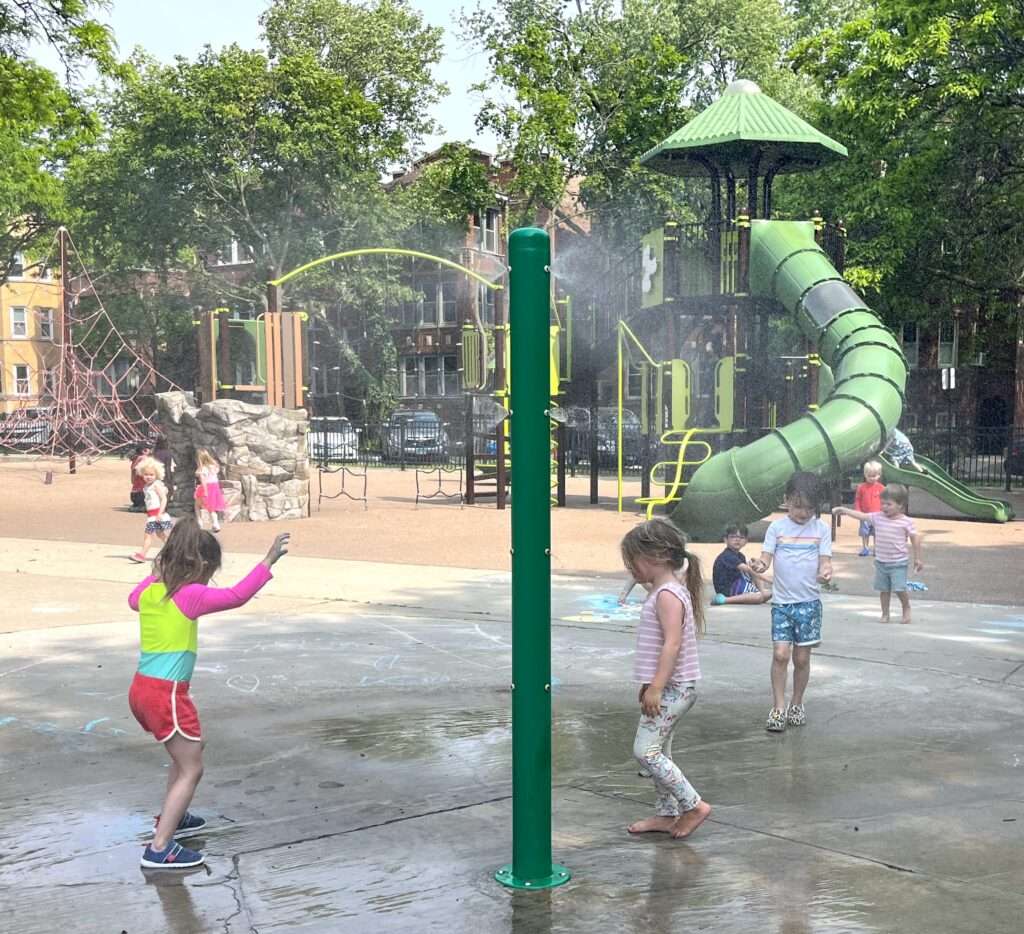
Summer time is the best time for outdoor water play! Children love splashing, pouring, and exploring – plus water keeps kids cool on warm days. Here are some great options:
The Classic – Sprinkler Play
Running through a sprinkler is one of summer’s finest pleasures. A stationary oscillating sprinkler (one that fans back and forth) can be especially fun to jump through and the oscillating movement adds excitement.
Nature’s Sprinkler – Summer Rain
A light rain on a summer day provides a sweet cool off as well as a science lesson. Invite children to imagine that they are a plant or an animal that needs rain to survive. Splash through puddles in your rain boots. But be sure to come inside if there’s any chance of lightning.
Improvisations – Baby Pools, Trays, and Buckets
If a trip to a swimming pool is out of the question, pull out a baby pool or some big trays and buckets, fill with water, and let your child splash and play with bath toys, tea sets, funnels and tubes. Add some big ice cubes for extra cool fun!
Safety note: Young children require constant adult supervision around water. Even a small amount of water in a bucket can be a drowning risk for little ones. Beware of slippery surfaces and teach children not to drink the water they use for play.
Nobody’s Perfect
Posted 3/14/2025
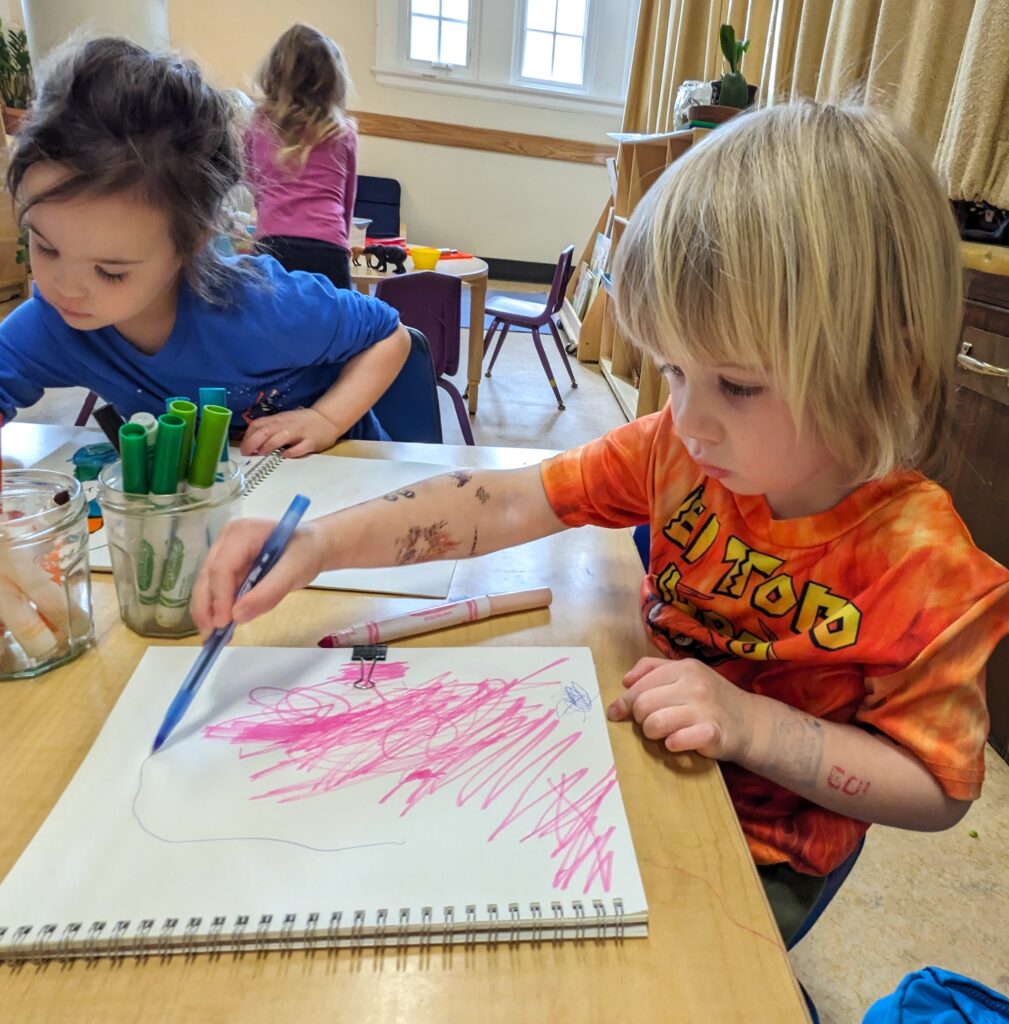
We’ve all heard the expression “Nobody’s perfect!” But sometimes we still put pressure on ourselves to meet unrealistic expectations. The same is true for young children who are working to learn new skills.
Teachers often notice this drive for perfection at the art and writing table, when children who are just learning to draw and write can easily become frustrated. A child who has a strong desire to make a specific thing, like a heart-shaped card that says “I love you,” might get really frustrated if the heart shape comes out crooked or the letters won’t fit on the paper.
These frustrations are actually a positive sign of growth! It means the child has developed the cognitive skills to think ahead, imagine what they want, and set a goal. It’s not unusual for young children to set unrealistic expectations for themselves as they attempt new challenges.
It’s okay to let your child struggle a bit. This is how they learn. As teachers, we “scaffold” our assistance, offering just enough help to support their growing independence. For example, if a child wants to draw and cut out a heart shape, the teacher might offer a stencil to trace. Or the teacher might help the child cut the tricky corners but let the child cut the straight lines on their own.
The next time you see your child struggling to accomplish an ambitious task, try holding back for a minute or two. Observe and ask questions. Then offer just a little bit of support and encouragement. And when your child completes the task, no matter how messy and imperfect the outcome, praise the effort. “You worked really hard and look at what you can do!”
Are You Dysregulated?
Posted 1/13/2025

I’ve noticed recently how the term “dysregulation” has made its way from a technical term to common conversation. The American Psychological Association defines dysregulation as an excessive emotional response, but I hear the term being used to describe simply feeling upset or having a hard time calming down. My grandmother used to call this being at sixes and sevens, which I always understood to mean a feeling that things don’t fit together quite right.
Here at FTCNS, we sometimes use the term “dysregulation” among adults (teachers, staff, parents) to describe a child who is having big feelings (often frustration and anger) and needs some time and space before they are ready to talk about it and move on. Sometimes a child who is dysregulated needs physical comfort like a hug or sometimes they need physical space, like a place to lie down on the floor.
Each of us are unique humans and we each need different things. Some children who are having big feelings will respond well to breathing exercises that help them calm and regulate As teachers and caregivers we can help a child who is feeling dysregulated by practicing co-regulation, modeling how to calm our bodies, and offering ourselves as a grounding, safe presence.
What I’ve written here is an oversimplification of a complex process, but I offer it as an explanation for what we are talking about when we use the term dysregulation at FTCNS. In a nutshell, it means that someone is having big feelings and we are ready to offer safety and support.
Honoring Our Mentors
Posted 11/12/2024

Last week we lost two important leaders in the field of early childhood education. Barbara Bowman, co-founder of the Erikson Institute, passed away at the age of 96. And Ella Jenkins, beloved icon of children’s music, passed away at the age of 100. Barbara and Ella were known and respected internationally but they both called the south side of Chicago their home.
The legacies of Barbara Bowman and Ella Jenkins live on at FTCNS. Barbara was my advisor at Erikson and her skilled advocacy for early childhood education impacts all that we do here. And Ella Jenkins’ signature call-and-response songs are often sung in FTCNS classrooms. Our staff mourns the losses of these important mentors and we are so very grateful for their contributions to our field.
Destroy Your Toys!
Posted 10/3/2024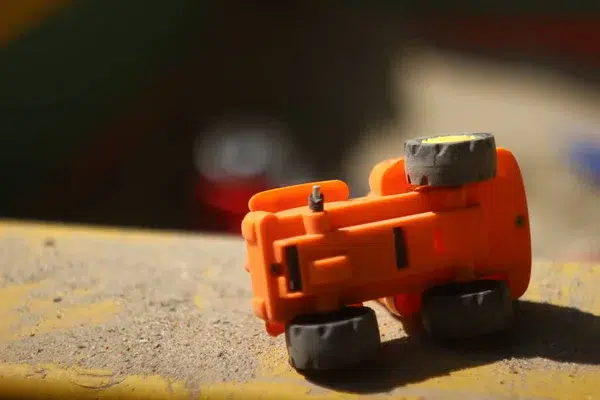
Toys break. Wheels pop off little cars, dolls lose their eyeballs, tops stop spinning. As parents, we often try to protect young children from disappointment by repairing or replacing toys while they’re not looking. Yet a broken toy may actually be a wonderful opportunity for learning.
Sometimes when a toy breaks we can see clues to the construction and design of the toy. This is especially true for electronic and mechanical toys. Many children are fascinated by how things work and are eager to see what mysteries are hidden inside their toys. This learning process has a fancy name “reverse engineering.”
The joy of discovering how things work is a big part of our new enrichment class – Music Engineering. We’re taking apart shakers, bells, drums, and even a keyboard to see what materials are used to make them and how they are put together.
Next time a toy breaks and you’re ready to throw it away, ask your child if they might like to take it apart. With a few tools and the gentle facilitation from adults, young children can learn introductory engineering concepts, such as the design and function of wheels, gears, and springs.
For more information, check out these resources:
https://www.instructables.com/Take-Apart-and-Rebuild-Toys/
Your New Back-to-School Bedtime Routine Starts Now
Posted 8/16/2024
What’s the hardest part about starting a new school year? For many of us, both adults and children, it’s waking up early and getting out of bed! This means that the very best way to ease the transition to school for your child is to begin establishing a consistent bedtime routine before the school year starts.
If your family has been staying up late and sleeping in during the summer, begin gradually moving to an earlier bedtime in stages. Have your child go to bed 15 minutes earlier each night rather than making one big sudden change.
Once the school year begins, a consistent bedtime routine will be key. Sleep experts recommend setting the stage for bedtime by eliminating screen time at least an hour before bed. Establish a consistent, relaxing routine such as taking a bath or shower, brushing teeth, reading a story, and singing a lullaby.
Choose familiar bedtime stories that provide comfort and gentle repetition. Some preschool classics include:
Brown Bear, Brown Bear, What Do You See? By Eric Carle
Goodnight Moon by Margaret Wise Brown
Caps for Sale by Esphyr Slobodkina
Goodnight, Goodnight Construction Site by Sherri Duskey Rinker
Llama Llama Red Pajama by Anna Dewdney
Mary Wore Her Red Dress by Merle Peek
A good night’s sleep is the foundation of health and wellness for both adults and children. A little extra care and attention to your child’s bedtime routine will go a long way to set your family up for a successful transition to the new school year.
Announcing the FTCNS Teacher Institute!
Posted 6/10/2024

The teachers at Families Together Cooperative Nursery School have many skills and talents but one particular area of strength is their ability to develop emergent curriculum activities in response to children’s interests. For example, the Junipers teachers noticed that some of the children were using the kitchen play items to pretend they were shopping at a grocery store. Within just a few days the teachers had developed a plan with families to collect empty food containers and create a pretend grocery store in the classroom.
We used this grocery store example as just one of the curriculum projects featured in our new FTCNS Teacher Institute workshop titled “Introduction to Emergent Curriculum.” This online asynchronous workshop provides 1.5 professional development hours approved by the Illinois statewide system for professional development for early childhood educators.
The workshop is intended for teachers who are new to emergent curriculum practices. The workshop explains the value of an emergent approach as well as practical guidance for how to begin implementing emergent curriculum practices. Video, images, explanations, and real-world scenarios bring the workshop ideas to life. The workshop answers three key questions: “What is an emergent curriculum?” “What are the benefits of an emergent curriculum?” and “How do I begin implementing an emergent curriculum?”
To celebrate the launch of the FTCNS Teacher Institute we are offering educators a special discount. Use the code EARLYBIRD2024 to receive $25 off enrollment in the workshop Introduction to Emergent Curriculum. Go to the FTCNS Teacher Institute portal and click on “Add coupon code” and enter EARLYBIRD2024.
For more information about the FTCNS Teacher Institute, contact director Ann Gadzikowski at director@ftcns.org.
Block Party (Indoor Block Play) Event – Saturday, April 13, 2024 – 9:30 to 10:30 a.m.
Posted 3/19/2024
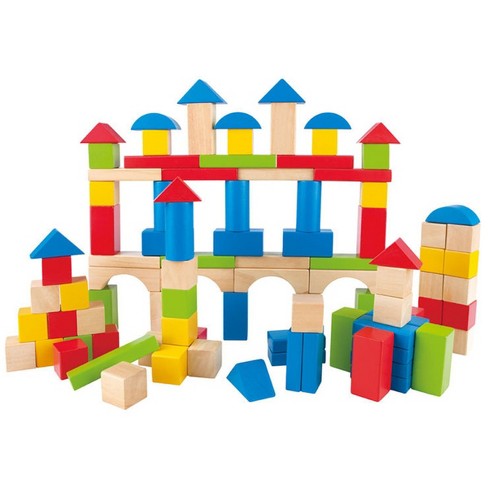
Blocks are just blocks, right? They’re random pieces of wood for stacking and building. Wrong! The wooden blocks we use for construction play at Families Together are a special type of learning material called “unit blocks.” The unit, or basic brick, is 5.5 inches long, 2.75 inches wide, and 1.375 inches thick. There is a beautiful mathematical relationship built into these dimensions, a 4:2:1 ratio. And all the other blocks in a unit block set are created in proportion to the unit – half units, double units, and more. The shapes are all part of a system that is carefully calculated to teach children mathematical concepts of shape, relative size, proportion, and fractions.
When your child plays with blocks at Families Together, they’re not only building castles, towers, and train stations, they are also building a foundation of mathematical thinking and spatial reasoning that will last a lifetime.
We are hosting a Block Party (Indoor Block Play) Event featuring construction play on Saturday, April 13 from 9:30 to 10:30 a.m. We”ll play with a variety of block sets and other construction materials. I authored the book “Young Architects at Play,” and will share information with parents about the benefits of block play, especially during the pre-kindergarten years. Bring your young architect (age 2 to 4) for a fun play session and learn more about our programs at Families Together Cooperative Nursery School.
Listen to the podcast where I discuss architecture education for children with Antonio Capelao, co-founding director at Architecture for Kids.
RSVP at admissions@ftcns.org.
STEM Lab Event – Saturday, March 9, 2024 – 9:30 to 10:30 a.m.
Posted 2/28/2024
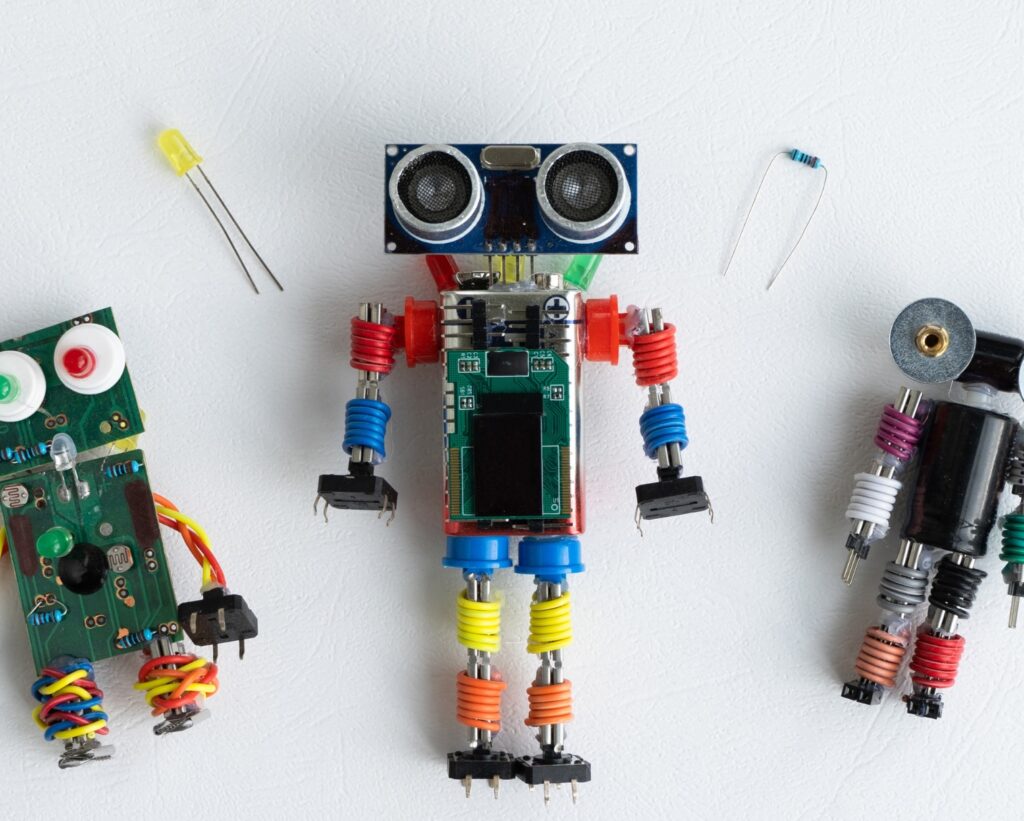
Visit Families Together and experience the joy of play! In our STEM workshop your child (age 2 to 4) will be invited to take on the role of scientist as they experiment with a wide range of STEM activities (Science, Technology, Engineering, Math).
Marine Biologist – Play with water, shells, and fish in our sensory table.
Meteorologist – Experiment with wind and air current using fans and feathers.
Veterinarian – Care for pets using toy doctor props.
Engineer – Construct houses and towers using magnetic tiles.
Botanist – Observe plant parts using magnifying glasses and a microscope.
Physicist – Experiment with cause and effect using balls and wheeled vehicles.
Computer Programmer – Program a robot to travel.
RSVP at admissions@ftcns.org.
Research on the Importance of Play
Posted 1/25/2024
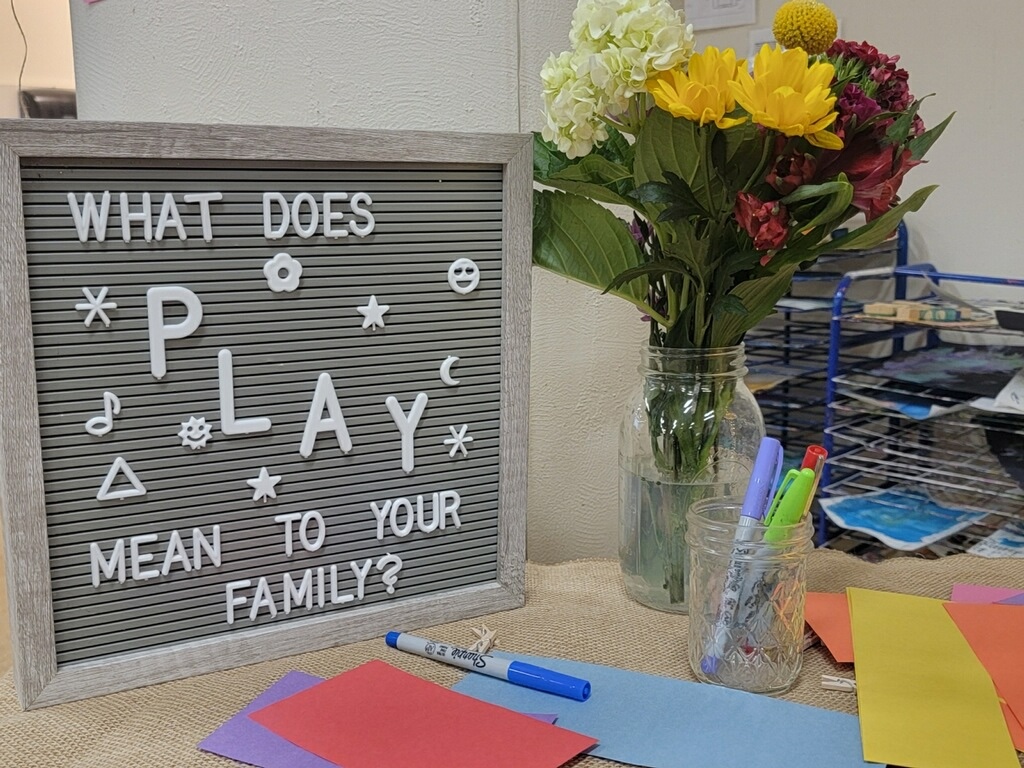
Play builds brains. Here are some links to the research I shared at our January Parent Meeting.
LEGO Foundation: Explore the Research
Tennessee Pre-K Study
Data through sixth grade from state education records showed that the children randomly assigned to attend pre-K had lower state achievement test scores in third through sixth grades than control children, with the strongest negative effects in sixth grade.
An interview with one of the Tennessee Pre-K Study researchers
“I think children are not learning internal control. And if anything, they’re learning sort of an almost allergic reaction to the amount of external control that they’re having, that they’re having to experience in school.”
A more recent update on Pre-K (preschool) research from EdWeek
We have evidence that children are receiving increased academics in the early grades, maybe receiving similar instruction in kindergarten, maybe being part of a classroom where there’s lots of large-group time that could be developmentally inappropriate [that could] result in disengagement or boredom.
Climate Explorers Enrichment Class
Posted 1/19/2024
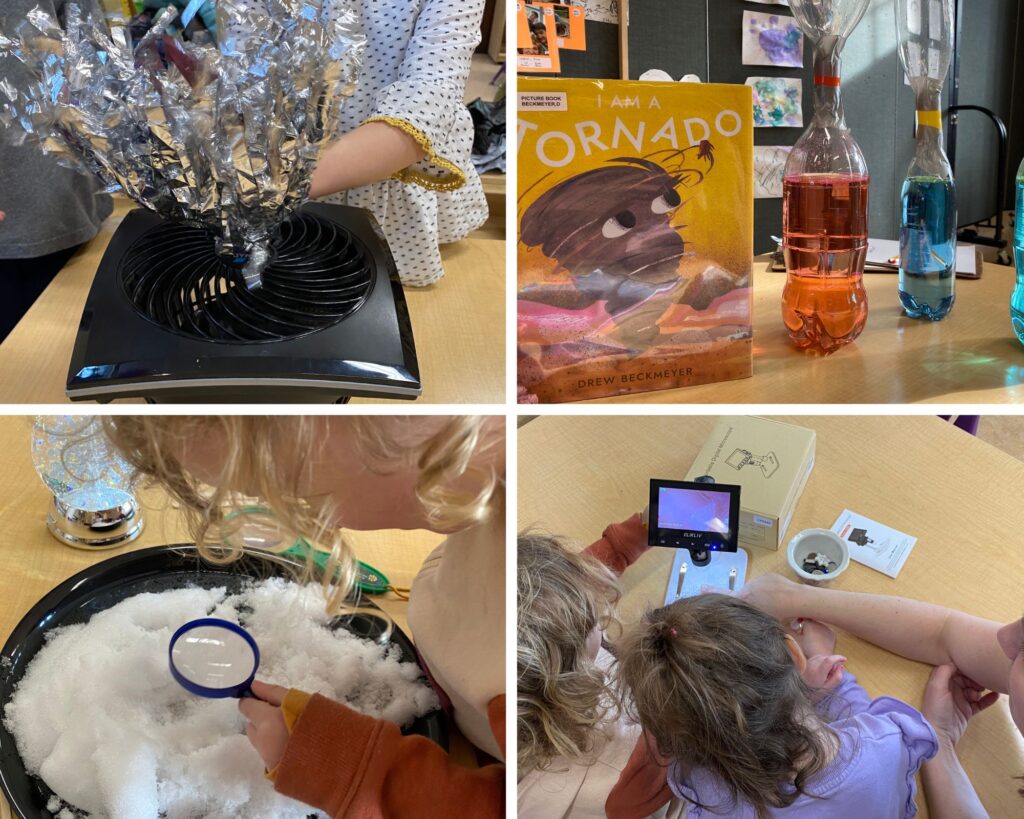 Yesterday was the first day of Climate Explorers, our new enrichment class. For our first class we explored different kinds of weather phenomenon including rain, snow, wind, and tornados. One of the most exciting experiments involved simulated wind (an electric fan) and light objects like streamers and feathers. We made predictions about what would happen and we tested our ideas. We also learned to use a digital microscope to observe things that are very small. The teachers and I made notes about the ideas and questions that captured the children’s attention and we will tailor the upcoming curriculum to their interests.
Yesterday was the first day of Climate Explorers, our new enrichment class. For our first class we explored different kinds of weather phenomenon including rain, snow, wind, and tornados. One of the most exciting experiments involved simulated wind (an electric fan) and light objects like streamers and feathers. We made predictions about what would happen and we tested our ideas. We also learned to use a digital microscope to observe things that are very small. The teachers and I made notes about the ideas and questions that captured the children’s attention and we will tailor the upcoming curriculum to their interests.
It’s not too late to join Climate Explorers on Thursday afternoons! There are openings in our 1:30 class and a few limited spaces in our 3:30 class. Climate Explorers Application – Winter 2024
Too Many Toys?
Posted 12/28/2023
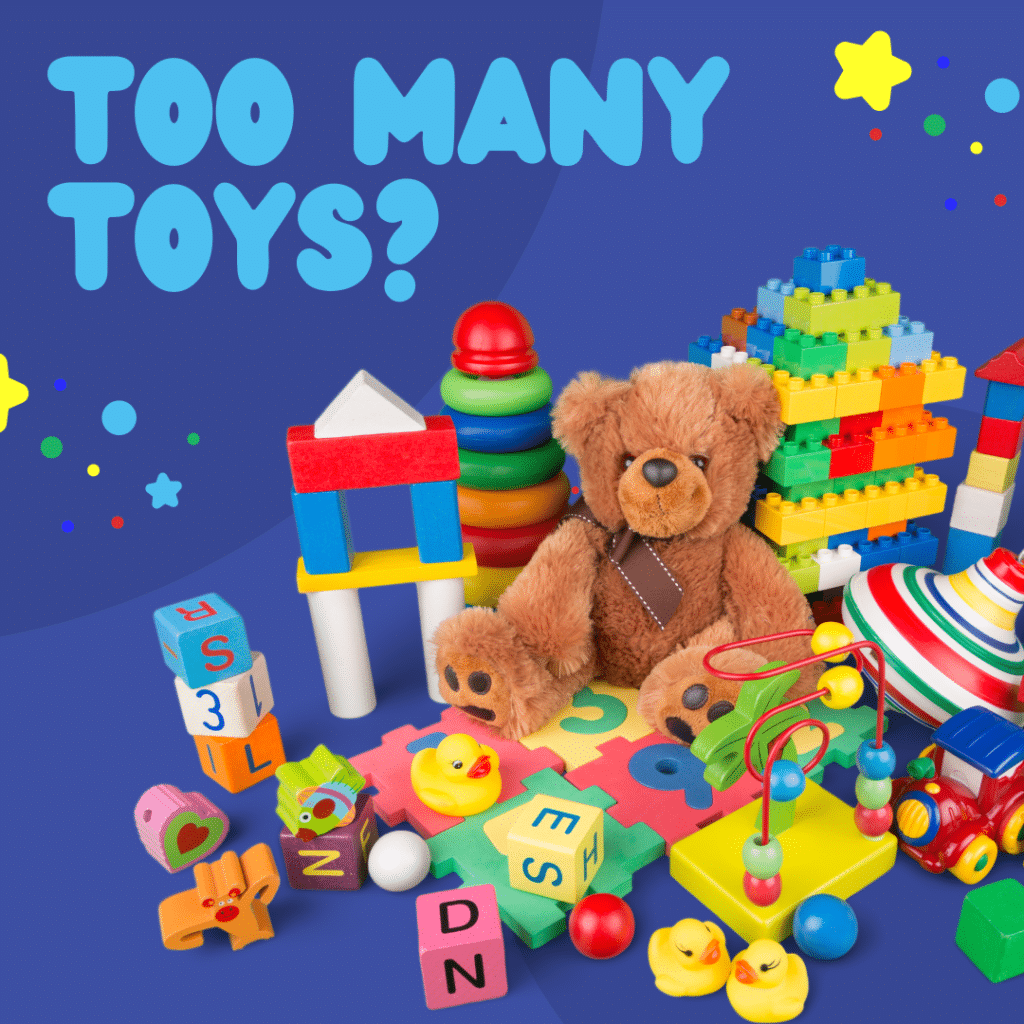 ˜Tis the season for clutter, especially when it comes to toys. If your child receives toys as holiday gifts, it might be time to clear out the old toys and make room for the new.
˜Tis the season for clutter, especially when it comes to toys. If your child receives toys as holiday gifts, it might be time to clear out the old toys and make room for the new.
Storage space is one issue, but did you know that children actually benefit from playing with fewer toys? Researchers have found that when children have limited toy options, they engage in longer periods of play, they are more focused, and they play more creatively. This means that getting rid of old toys will benefit your home decor as well as your child’s wellbeing.
Here are a few pointers to help you get started:
1. Look for duplicates. Your child probably doesn’t need multiple copies of the same game or puzzle.
2. Look for toys your child has outgrown. If your child hasn’t touched a certain toy for several months, that’s probably a sign that their interests and abilities have moved on.
3. Look for toys that are broken, worn, or missing pieces. Teaching children to clean and repair their own toys is a valuable lesson, but if toys are beyond an easy repair, it’s time to let them go.
Some children may have a hard time parting with their old toys. It can be helpful to give children choices about which items will be given away. For example, show your child a group of old toys and say, “Here are some toys you haven’t played with for a long time. Let’s pick three toys to give away. Which three should we pick?”
It’s also helpful to establish a family rule such as “toy in, one toy out” that allows children to anticipate the need to curate their toy collection. While most children experience a lot of excitement for new toys, as children grow older they can begin to understand that caring for our planet (and for each other) sometimes means buying and owning fewer things.
What Can Kids Do to Take Care of Our Planet?
Posted 12/14/2023
 What does the COP28 Climate Summit have to do with FTCNS? This international conference just took place in Dubai and led to a landmark agreement on reducing dependence on fossil fuels. But how does that work relate to fort building, snack time, and other FTCNS activities?
What does the COP28 Climate Summit have to do with FTCNS? This international conference just took place in Dubai and led to a landmark agreement on reducing dependence on fossil fuels. But how does that work relate to fort building, snack time, and other FTCNS activities?
Raising resilient, creative, and caring humans starts in early childhood, of course. While it’s easy to become discouraged about the negative effects of climate change on our planet, I am inspired and optimistic every time I watch our FTCNS children building, inventing, collaborating, and caring for each other through play.
Nurturing children’s creative problem-solving skills will be the focus of Climate Explorers, the unique enrichment class we are piloting this winter on Thursday afternoons. Each week we’ll offer creative play activities that teach concepts related to weather, water, and caring for our Earth. These classes are open to both current FTCNS families and alumni, as well as the broader community, so please help spread the word!
In November, when I presented a session at the NAEYC annual conference titled “Young Children and Climate Change,” I talked about FTCNS and the importance of play in developing the skills, dispositions, and knowledge that children will need to thrive in a world impacted by climate change. Our Climate Explorers class is just one way we support children’s healthy development through play at Families Together.
How to Talk to Children about Thanksgiving
Posted 11/15/2023
 We don’t teach the traditional Thanksgiving story in our school. And yet our children are probably still exposed to commercial and media images of pilgrims in buckled hats and Indians in feathered headdresses. Parents often wonder “ How do we explain to our children that many images and stories about indigenous people in the U.S. are based on stereotypes and misinformation?”
We don’t teach the traditional Thanksgiving story in our school. And yet our children are probably still exposed to commercial and media images of pilgrims in buckled hats and Indians in feathered headdresses. Parents often wonder “ How do we explain to our children that many images and stories about indigenous people in the U.S. are based on stereotypes and misinformation?”
I’m often surprised by how well preschool children are able to understand and use the word “indigenous.” We can explain that indigenous people were the first people to live on this land. Today, some indigenous people (relatives of the first people) still live here in the Chicago area.
Sometimes indigenous people are called Native Americans or Indians. Some indigenous people prefer to be called by the name of their group, like Potawatomi or Chippewa. We know that at Families Together, each person gets to decide what they want to be called. If you know or meet someone who is indigenous, ask them what words they would like you to use.
Regarding the story of the first Thanksgiving, we can explain to children that there is an old story about travelers called pilgrims who came to the land that is now the United States. The story tells us that indigenous people who were already on the land shared their food with the pilgrims. That special meal was called Thanksgiving because everyone was thankful for the food and for each other. We don’t know if that story is true, but we do know that it’s good to share with others. We might ask children to think about times they shared something with others and when others shared with them. How did that feel?
This Thanksgiving I’ll be especially grateful for this FTCNS community. Thank you for the care and support you offer to our staff and to each other every day.
Climate Change & Young Children
Posted 11/7/2023
Next week I’ll be attending the annual conference of the National Association for the Education of Young Children (NAEYC) in Nashville, TN. This is the largest and most prominent professional conference for those of us working in the field of early childhood education. It’s kind of a big deal! I will be attending many sessions on play-based learning, diversity and inclusion, community outreach, and other topics related to our work at Families Together.
I’ll also be presenting a session titled “Climate Change and Young Children: The Importance of Play.” In my session I’ll advocate for empowering children to become resilient problem-solvers through a variety of rich play experiences. And I’ll present a framework educators can use to prioritize play that:
- Nurtures joy in the natural world
- Builds problem-solving skills
- Introduces content knowledge
- Models and supports empathy and care
If climate change, protecting our Earth, building resilience, and fostering empathy are topics of importance for you and your family, it may interest you to know that we are developing a STEM enrichment class at FTCNS that addresses these specific issues. We’ll soon be announcing a pilot program called “Climate Explorers” that we will launch this winter. Look for more information soon!
Warmly,
Ann
Young Children as Creative Planners and Active Citizens
Posted 10/19/2023
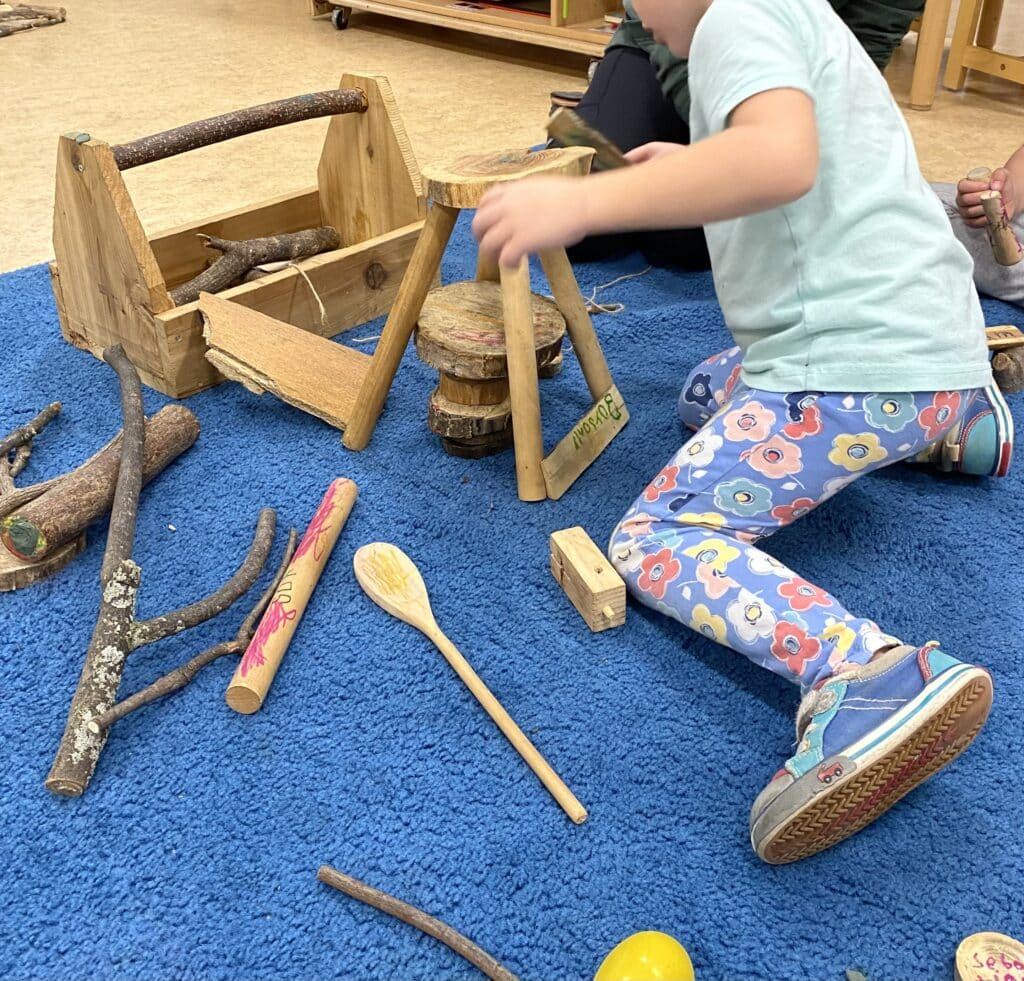
This week our Families Together afternoon classes enjoyed a visit from Sean Shaffer and Bob Bryant, Chicago Park District nature play specialists. Sean and Bob explained to the children our process for creating a nature play space in Senn Park and they invited the children to brainstorm and share ideas for park features. The children drew maps and built constructions with sticks, logs, string, and other materials. Some of the ideas included a super fast zip line and a unicorn treehouse!
At FTCNS, we often involve children in making decisions, so this process probably seems pretty normal and natural around here. But I can tell you that, sadly, giving children a voice in important decisions is a rare thing in our world today. The radical idea that children should have a say in shaping their own environments is not something most schools and governments take the time to embrace or even consider.
One important role model in lifting the voices of children as creative urban planners is Mara Mintzer, a city planner in Colorado and program director of Growing Up Boulder. (I highly recommend Mara’s popular TED Talk “How Kids Can Help Design Cities.” A few years ago I was lucky to interview Mara for an episode of the podcast Raising Curious Learners. She has ideas for including even young toddlers in shaping the plans for parks and urban areas in downtown Boulder, Colorado. I think our nature play design process here in our FTCNS community is very much aligned with the creative approaches used by leaders like Mara.
We hope your family can join us for a design session in Senn Park on Saturday, October 21 between 2:00-5:00 pm. Sean and Bob will facilitate brainstorming with open-ended materials as we continue our creative process in shaping the future of our park!
The Importance of Snack and Meal Time for Preschoolers
Posted 10/6/2023
 Consider this question “ What part of the preschool day is most important?” Some might answer story time, when children make connections between print and language. Others might suggest play time, when children cooperate with friends and form social bonds.</p>
Consider this question “ What part of the preschool day is most important?” Some might answer story time, when children make connections between print and language. Others might suggest play time, when children cooperate with friends and form social bonds.</p>
All the parts of the school day provide opportunities for learning, but lately I’ve been noticing how much exciting learning happens at snack time and lunch
time. The learning doesn’t stop during meals. In fact, some of the most important moments in your child’s growth and development happen during snacks and lunch.
At meals, children build executive function skills such as following routines. Before the meal, children must wash their hands and come to the table. After the meal, children must put their food items away and clean up their spot. These are no small feats, especially for our youngest Families Together students.
Then there’s the food itself – children are learning new vocabulary related to the multi-sensory experience of eating. They are learning the meaning of words like “salty,” “sweet,” and “crispy” through direct experience. And speaking of language, some of the most complex conversations at school happen during meals as children reflect on their experiences and debate important issues (such as what to wear for Halloween or which songs from Frozen are best for dancing).</p>
We may tend to think of meals as a break from learning but they are, in fact, among the most important parts of the day!
Prepare for Back-to-School Separation Anxiety
Posted 8/31/2023
 It’s normal for young children to feel worried or sad when they say good-bye to their families and go to school. Parents may have separation feelings too! Here are a few pointers that might help.
It’s normal for young children to feel worried or sad when they say good-bye to their families and go to school. Parents may have separation feelings too! Here are a few pointers that might help.
Talk about feelings. Help your child name their feelings. If your child cries when it’s time to say goodbye, say, “It’s okay to feel sad or worried about going to school.” Later, after your child has a positive experience, remind them that big feelings don’t last forever. “Remember how worried you were? Now you seem really happy and excited. Isn’t it funny how feelings change?”
Establish a predictable school-day routine. Routines help children feel secure and know what to expect. For example, saying goodbye the same way every day helps to ease separation anxiety. (“It’s time to hug and blow three kisses.”)
Read books about separation. Picture books that help children and families talk about separation include Owl Babies by Martin Waddell and Llama Llama Misses Mama by Anna Dewdney. When your child has separation feelings, use the story to reassure your child. “Remember how the owl mother always comes back? I’ll be back, too!”
Let’s Pretend! How Play School Prepares Children for Real School
Posted 8/24/2023
Help your child get ready for back-to-school by playing school at home. Dolls or stuffed animals can serve as students, and your child can pretend to be the teacher!
Practice these important skills:
How to get ready for school in the morning: Invite your child to help their toy get ready for school. Pretend they are waking up, getting dressed, and prepping their backpack and supplies.
How to ride the school bus: It’s time for the toys to catch the school bus! Pretend to drive around the neighborhood, pausing at each bus stop to pick up one of the toys. Make sure everyone buckles their seatbelt!
How to make friends: Pretend that one of the dolls or toys is sad and lonely. What can they do to make a friend? Invite your child to help.
How to eat your lunch at school: Pack a pretend or real lunch and invite your child to “play” school lunch. Use this play lunch session to talk over what meals and snacks will be like at school.
Many children are especially delighted when their parents also pretend to be students at school. Your child may enjoy telling you exactly how to follow school rules!
Watch the Director’s Blog by Ann Gadzikowski for more back to school tips.
5 Back-to-School Tips for Families
Posted 8/17/2023
1. Inform yourself about school plans and schedules. Bookmark the school website and read the school handbook. Download and print the school calendar. Collect logins and passwords for school accounts.
2. Visit the school with your child. If your child is starting school, plan a school visit and, ideally, meet your child’s teachers before the first day. Create a document or list of important things the teachers should know about your child. Play on the playground, if possible.
3. Make a family plan and schedule. Plan your family’s school day schedule, including wake up, meals, drop-off, pickup, and bedtime. Make a visual schedule for your child that shows a picture for each part of the day.
4. Establish new routines before the first day of school. Your family’s school day schedule may include an earlier start, less screen time, less playtime, and an earlier bedtime. To help your child adjust, gradually move toward the new schedule a few weeks before the first day of school.
5. Commit to regular school involvement. Regular contact with your child’s teacher is critical to your child’s school success. Get involved with school activities as much as your schedule will allow. Plan ahead for parent-teacher conferences and other school events.
Watch the Director’s Blog by Ann Gadzikowski for more back to school tips.
Bio – Ann Gadzikowski
Families Together Director Ann Gadzikowski is an award-winning author and educator with a passion for challenging children to think creatively and critically. A graduate of the Erikson Institute, Ann has many years of experience as a teacher and director of early childhood programs and her work with children embraces both the arts and the sciences.
Ann’s credentials in music and literature informed her role as executive director of Preschool of the Arts, a Reggio-Emilia inspired school in Madison, Wisconsin. Ann developed expertise in robotics, computer science, and engineering through her role as early childhood coordinator for Northwestern University’s Center for Talent Development. She served as a curriculum director and executive editor for Encyclopedia Britannica and is a frequent speaker at events in addition to teaching early childhood education courses at Oakton College.
